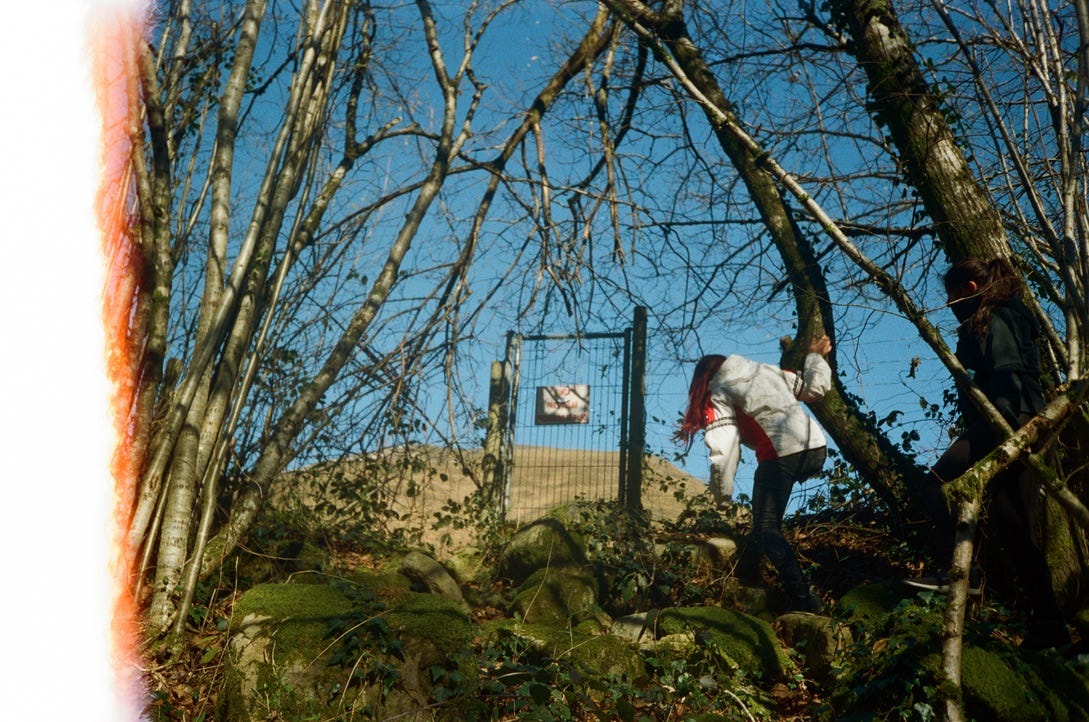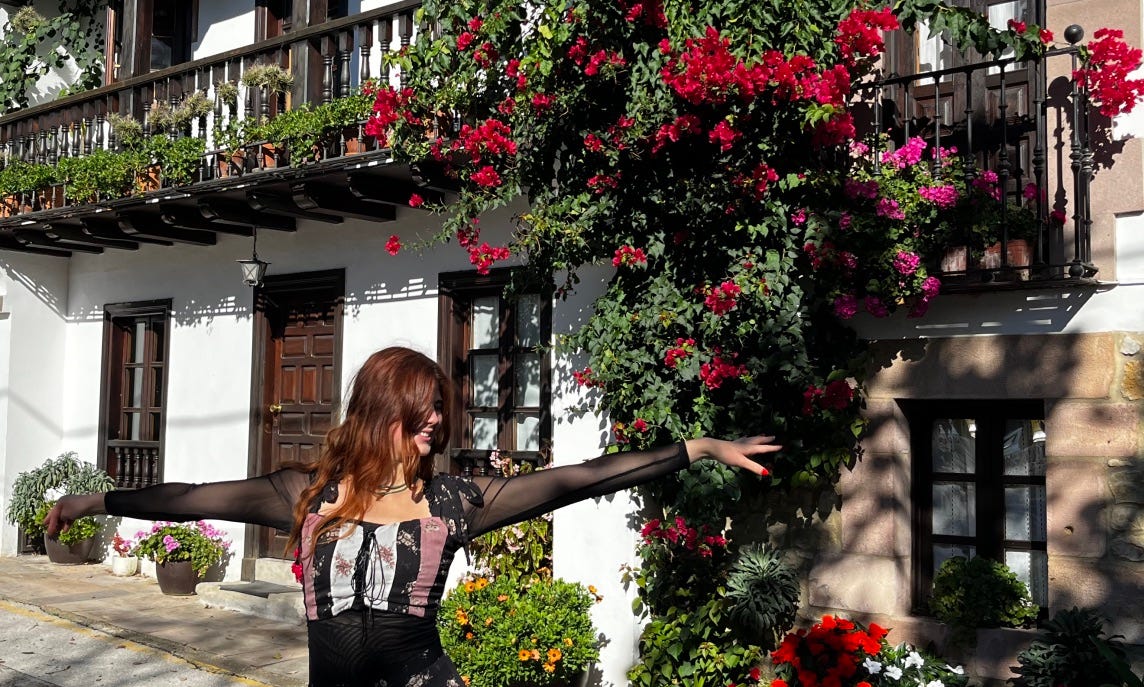NALCAP: The Easiest Way for North Americans to Move to Spain and Explore Europe
A major resource dump. Lots of helpful links so don't fret. Free wake-up call included.
Disclaimer: This post is titled “the easiest way to move to Spain” as if I’ve tried other ways of living in Spain successfully (I haven’t). But the way I got here has to be one of the most common for many native English speakers with a college degree as it includes a legal 8-month-long stay with possibility for renewal, a monthly stipend, and plenty of time to take advantage of cheaper and quicker ways to travel around Europe.
All links throughout the post are also listed at the very end of the article.
Living in Spain for the past two (school) years has been no small feat; the bureaucracy, apartment hunting, meeting-new-people thing, and adapting-to-a-different-culture thing have been obstacles in the adaptation process of moving to a new country by myself. What didn’t help was later learning that the Spanish colloquialisms I learned living in Yucatán don’t function here, kitchens open at 8PM for dinner, and almost everything is closed on Sundays (except for your local bazaar aka your guardian angel).
I’d feel like I’m gatekeeping valuable information and resources if I never wrote about how I’ve been living in Spain since I graduated college in 2022. This post is going to provide general information that will help you decide whether or not this experience is for you. So, let’s get into it.
Overview
NALCAP
NALCAP Eligibility
NALCAP Application Process
Soooo when I get placed in the program… how do I get to Spain?
Note of Motivation
Make your money go a long way in Spain (RECOMMENDED READ)
Apartment Hunting
Motivated? Unmotivated? Both?
Important Program Links
Additional Resources
1. North American Language and Culture Assistants Program
The North American Language and Culture Assistants Program (NALCAP) looks for native English speakers to work in public elementary and high schools in Spain as English teaching assistants. Your schedule ranges from 14 to 16 hours a week four days a week, which offers plenty of free time for travel, pursuing hobbies, or even pursuing a side hustle or starting a business!
“As a language assistant, you will be fulfilling the role of a cultural ambassador as you advance English language learning and mutual understanding through cultural exchange. As such, your role is to encourage students of all ages in Spain to broaden their knowledge of your language and culture.” - quoted from the NALCAP main page
Depending on the number of hours and location, the monthly stipend varies from 800 to 1000 euros a month, and always includes health insurance. This stipend can be enough if someone brings savings with them. However, many people pursue private English classes on the side to supplement the stipend. Depending on your region, you could also get permission to work for up to 30 hours a week and lock in a part-time English academy position. These opportunities are often found through WhatsApp group chats for assistants (who are also called “auxiliares”) in the same city, Facebook groups, or even other employees at the schools. The program (in most cases) runs from October 1st to May 31st.
2. NALCAP Eligibility
To participate in the program, you do NOT need a certificate to teach English, but you do have to check off all of the following requirements.
Be a U.S. citizen and have a valid passport through the date of the last day of your participation in the program (May 31st, 2025 in all of Spain except for Madrid which is June 30th, 2025)
Have a BA, BS, AA or AS degree or be enrolled as a sophomore, junior or a senior in a BA or BS program.
Be a native-like speaker of English
Be in good physical and mental health
Have a clean background check
Be aged 18 - 60. You must be at least 18 years old as of January 1, 2024, and not be 60 or over on January 1, 2025, to participate in the program. Disclaimer: Age ranges have to do with labor regulations in Spain.
Be responsible, broad-minded, have a flexible attitude, and be open to new ideas and cultures (don’t forget you’re making an impact on the students’ educational experience!)
While the program site says you “should have a basic level of Spanish to use in everyday life in Spain,” I wouldn’t let not knowing basic Spanish deter anyone from applying to the program. There are many assistants who get by without knowing any Spanish. In a bigger city, many people will know English and be able to communicate with you regardless of your Spanish level. We’re in the 21st century; translating apps are a great thing (my favorite is SpanishDict), so use them! If you want to learn Spanish I’d say this program is the perfect opportunity for you to immerse yourself in the language on a daily basis and learn it through experiencing it, which is the best way to learn a language!

3. NALCAP Application Process
Considering it? Not sure? The application process allows you to apply even if you’re unsure, and decide later whether you actually want to commit to living abroad for 8 months. When you get your school and city placement, you have three days to accept it. If you don’t accept within the three days, the opportunity will get passed on to the next person in line.
The documents required for your NALCAP application include:
A copy of the main page of your US passport
Official college transcript or copy of your diploma
Signed statement of purpose
How to successfully apply for the program without problems can be found in the Application Guidelines handbook and the PROFEX handbook (which explains how to use the application portal) on the NALCAP website. Getting informed on the required documents and being prepared before the application opens is important if you want to get placed in the region of your dreams. In the application, you have the opportunity to list your top three regions of choice, the student age range you prefer to work with, and whether you prefer working somewhere rural or urban. The earlier you submit your application, the more likely you are to receive a school placement within your preferences!
This year, the application opens on February 9th and closes on April 4th, 2024. So you still have more than enough time to gather your documents and apply!
[Fall 2024 update: information for the 2025-2026 school year still not available. Take advantage of this time to research and think about it.]

4. Soooo when I get placed in the program… how do I get to Spain?
Time for the bureaucratic b******t.
Honesty hour. Long-term travel isn’t as romantic as it seems.
The most confusing and frustrating part is the legal process. It’s an inevitable part of whatever opportunity or visa you apply for if you want to stay longer than the EU tourist visa limit of 3 months (which is 3 months in the Schengen Zone in general, so you can’t hop from a 3-month trip in Spain to another 3-month trip in Italy, for example, unless you’re a legal resident or citizen in a Schengen zone country). It’s a nightmare, it’s a headache, but you’re not alone and there are tons of resources giving you step-by-step instructions on each part of the process and program. It’s a small price to pay for the invaluable, life-changing experience you get once all of that preparation is over.
Having only three days to accept your placement means you want to provide an email you check regularly. Once you accept your position, you can start gathering your documents for your Student Visa application. There is no way you can do this program without having the required Student Visa, which grants you a legal status in Spain. You’d apply at your local Consulate of Spain in the US after gathering all the required documents.
What do you need for your Spanish visa appointment? The following:
US passport together with a photocopy (must be valid for at least 6 months after your participation in the program)
Driver’s license or state issued ID and a copy
2 recent passport photos
FBI background check apostilled by the US Department of State
Keep in mind your background check expires within five months, must be valid when you begin the program
DON’T UNSTAPLE APOSTILLE FROM OG DOCUMENT UNDER ANY CIRCUMSTANCES!!!
Your background check must also be translated in Spanish by a certified translator
Your original letter of acceptance (carta de nombramiento) and a copy
Money order for the visa processing fee of $160 USD, payable to Consulado General de España
Original medical certificate (received within 3 months of starting the program)
What I’d recommend working on first would be your criminal background check. Since it needs to be apostilled by the US Department of State, it’s unpredictable when you’ll get that back to you. Mine took six weeks. The convenient part is you get to gather other documents while getting over your anxiety about that one time you picked up a felony for getting caught with your poorly disguised fake ID at the local college bar. The legal drinking age in Spain is 18, so hopefully the Spanish embassy takes your application into consideration with sympathy. Fingers crossed if this applies to you.
This article is only meant for general information so you can get an idea of whether or not this program is right for you. For additional important details on the Visa process, please refer to the NALCAP Visa Guidelines pamphlet rather than this post!
5. NOTE OF MOTIVATION
HEY ;)
PLEASE DON’T LET THE LONG LIST OF TO-DOs SCARE YOU AWAY. If you apply for the program in a timely manner and meet all the requirements you’ll most likely get a placement. After that, all it takes is your motivation to take advantage of the opportunity and make it happen. YOU CAN ACTUALLY LIVE IN SPAIN FOR 8 MONTHS AND MORE!!! If you want it, it’s in your hands. The view over here is sooooo worth it. Hope to see you on the other side of the pond. <3
6. Make your money go a long way in Spain
Moving abroad can be pricey; besides the visa fees, flight, accommodation, and food while apartment hunting, it’s important to know you won’t get your first paycheck until **at best** the end of October/beginning of November. Some regions like Valencia are notorious for being several months late on their payments, so it may be valuable to research the experiences of auxiliars from previous years if you don’t have extra cash to spend.
In particular parts of Spain, surviving on the stipend is doable if you stick to a strict budget. But when in Spain… who wants to be resisting the delicious restaurants, the vibrant social life, and the myriad of affordable travel opportunities?!
Last year, I was living in Santander, Cantabria, working 12 hours a week for 700 euros a month. Thankfully, I brought savings with me that I was planning on using for the hedonistic purposes of eating out, trying new things, and touring Europe. Regardless, it’s recommended to come with some extra money that covers the first few months of expenses, such as food, shelter, and the fun you want to have — you’re in Spain and the rest of Europe is at your fingertips! If you’re doubting your ability to survive off just the stipend and your savings, or if you don’t have savings but still want to do the program, here are EIGHT wallet-friendly options to make your living-abroad dreams come true.
Join the WhatsApp group chat of your regional or city placement (if you don’t have WhatsApp, it’s a MUST-HAVE). When you arrive in Spain (or even before), stay attentive to the group chat for private English tutoring opportunities or academy positions which can give you a more stable additional monthly income. Although you’re technically in Spain on a student visa and aren't ¨working,¨ you can get permission to work from the government for up to an additional 30 hours.
Connect with assistants who are currently in your city or region of choice via the Facebook Group or the WhatsApp group. Ask them about their experiences; most people are more than happy to help out the newbies! If they don’t plan on renewing their contract, you could ask them kindly to connect you to their private tutoring gigs or academy position so you have a side hustle ready for you as soon as you get to Spain.
Be an au pair. Nervous about apartment hunting? Want to save on rent? There are many families all over Spain looking for an au pair. Not only are room and board free, but you’re also supposed to be receiving a minimum of 70 euros per week of pocket money. To make sure you feel comfortable with the family you find, you can inquire in the group chats I mentioned above whether any current language assistants have had an au pair experience or know anybody who has. Au Pair World is one of the most popular websites, where au pairs get matched with compatible families. This is a great way to practice your Spanish, help more children with English, and get involved with local culture and activities. Au pairing for the school year is a great option for someone who perhaps doesn't have a lot of savings, but wants to do the program anyways.
Do a volunteer work exchange with Workaway or Worldpackers. Almost all work exchanges on these sites offer shelter and food. This can be a short-term stay for the time you need to get an apartment, or even a long term gig if you can organize your volunteer schedule with your school schedule!
While apartment hunting, stay in affordable accommodation like hostels or shared Air Bnbs. Not only will you be saving some of the money you would’ve spent on a hotel or whole AirBnb for yourself, but you’ll be able to meet new people and have easy opportunities to socialize (and perhaps even meet another auxiliar) within your first few weeks abroad. For my first two weeks in Spain I stayed in an affordable room from AirBnb in an apartment with a Peruvian family— they were super helpful in my apartment hunting process, and made me canchita!!!
Private English tutoring roles can be found in the group chats you enter and through the people that you meet. All it takes is being attentive and hopping onto opportunities that come your way. There’s also lots of websites looking for virtual English language teachers; however, for some of these it’s possible you’ll need a background in Education or at least a TEFL certificate.
Having a part-time remote job based in the US is an ideal situation. US wages can go a long way in Spain. Nevertheless, be aware that in huge urban centers like Madrid, Barcelona, and Ibiza, prices can get hefty.
Get a side hustle, or bring your current side hustle over to Spain. When I say side hustle, I think entrepreneurial pursuits outside of private English tutoring, such as doing freelance Upwork gigs, freelance SEO, writing, social media marketing, whatever you excel at that can provide a valuable service to people!

7. Apartment Hunting
There’s always a dark side to the things we romanticize, especially when it comes to living abroad. After the visa application, apartment hunting (IMO) is the second most complicated part about moving abroad.
My first time ever apartment hunting by myself was in Santander, Spain. I stayed in an Air Bnb room with a family who informed me on the process and market there, and even gave me the number of a friend of theirs who was a real estate agent. They referred me to some reliable real estate agencies, and recommended using Idealista (the Spanish version of Zillow) for more options.
Having that local support when knowing nothing about how to rent an apartment felt comforting, especially when pursuing the process alone. Things happen, like when someone you’d agreed to live with backs out on you last minute after already having decided on an apartment and messaged the landlord less than a week before needing to move in. Or was that just me? My new job in that moment became a saleswoman on WhatsApp — reaching out to other assistants looking for last-minute roommates in order to send the deposit and seal the deal.
Throughout my first two weeks abroad, I was so exhausted from running around visiting apartments, messaging and calling landlords, amongst other bureaucratic stuff like opening up a bank account and trying to get my Spanish identification number (NIE) (which normally would be on the visa in your passport… but mine was not *facepalm*), a number you need to do almost anything when moving your life to Spain. Easily, my first two weeks in Santander were probably the worst weeks out of the whole rest of my time in Spain. I remember even questioning why I had come to Spain in the first place. A month in — vibing it up with my extremely lucky new roommate situation, exploring the city and it’s surroundings, meeting new people— that thought disappeared with gradient grace.
This year, apartment hunting in Málaga this time taught me the hard way that apartments get rented fast here; giving yourself too much time to think can ruin your chances of getting what you want, especially in hot, up-and-coming cities. At the brink of losing hope three days before October 1st, I messaged a landlord about visiting an apartment I liked. Quickly we were able to set up an apartment visit. Then and there I made the decision to avoid losing another apartment I liked, like I had the previous day, when I was an hour late to express my interest and the person who visited it immediately after me immediately claimed it, too. Luckily, my last-minute find was also one of the best-valued apartments I’d visited, with the center and my school both accessible via nearby public transportation.
Apartment hunting is a process. The sooner you get to Spain before October 1st, the better (and less stressful). That’s not always possible, especially with the unpredictability of the visa process. Really, there is no deadline to finding a place to live in, but the process is easier when you’re not working because you have more free time, feel comfortable, and start getting settled in before the first day.
Just a quick reminder that you have so many other options while apartment hunting, like renting a room or bed in an affordable Air BnB or hostel, being an au pair, doing a Workaway, and more!
8. Motivated? Unmotivated? Both?
There’s a lot of information left out of this article, because there are so many details and experiences people have, that it’s almost impossible to include and summarize all the nitty gritties. I’m open to questions, comments, or concerns about anything regarding the program and my experience with it. If I don’t have an answer, hopefully I could provide an external resource instead.
Any goal that reaps amazing rewards requires some kind of effort to get there. Your dreams don’t get handed to you on a silver platter. But holy sh*t! The view from up here is so incredible and surreal! Being on the other side of the process makes you feel unstoppable; you gain a confidence that assures you that you can do literally anything. Living abroad really can be all butterflies and rainbows, if you do it right by educating yourself and being aware of and accepting all the possibilities. The only way you’ll find out for yourself is if you do it at all.
9. Important Program Links
North American Language and Cultural Program
Required Application Documents
Recommendation Letter Guidelines for the Writer
Application Guidelines for US Citizens 2024-2025
Visa Application Guidelines US Citizens 2023-2024 (2024-2025 version comes out in April)
10. Additional Resources
How to Get FBI Background Check Apostilled
Auxiliares de Conversación en España Facebook Group (soooooooo resourceful!!!!!)
Idealista (apartment hunting platform)
Fotocasa (another apartment hunting platform)
The Spanish Group (certified translators)
Workaway (volunteer work exchanges)
Worldpackers (volunteer work exchanges)
NALCAP Youtube (lots to see)
Break a leg! Or as some may say in Spain, ¡mucha mierda!
With peace, love, and compassion,
Tea








this is so helpful!! ill recommend it to the spanish learners group i'm in